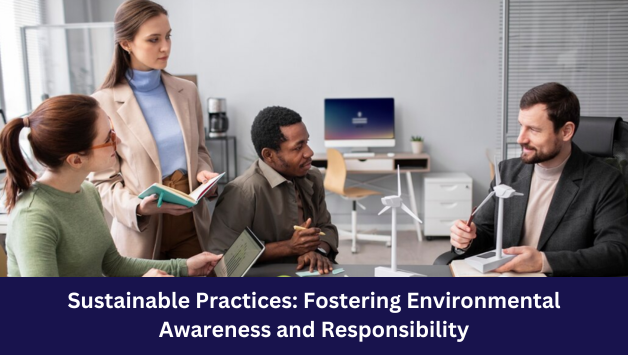Introduction:
In today's world, sustainability has become a critical imperative, and educational institutions play a vital role in fostering environmental awareness and responsibility among students. Delhi Institute of Higher Education (DIHE), in collaboration with the Top PGDM Colleges in Greater Noida, is committed to leading the way in promoting sustainable practices on its campus and beyond. In this article, we explore the various initiatives undertaken to instill a culture of environmental stewardship and sustainability among its students, faculty, and staff.
Campus-wide Sustainability Initiatives:
The Institute has implemented a range of campus-wide sustainability initiatives aimed at reducing its environmental footprint and promoting resource conservation. These initiatives include energy-efficient lighting and appliances, water-saving fixtures, waste reduction and recycling programs, and sustainable transportation options. By incorporating sustainable practices into campus operations, it demonstrates its commitment to environmental responsibility and sets an example for the wider community.
Green Buildings and Infrastructure:
The Institute’s campus features green buildings and infrastructure designed to minimize environmental impact and maximize energy efficiency. From eco-friendly construction materials and passive cooling techniques to rooftop gardens and solar panels, and also green buildings showcase’s innovative approaches to sustainable design and construction. These buildings not only reduce energy consumption and greenhouse gas emissions but also create healthier and more comfortable learning environments for students and faculty.
Environmental Education and Awareness:
The Institute integrates environmental education and awareness into its curriculum and extracurricular activities to foster a deeper understanding of environmental issues and solutions among students. Courses, workshops, seminars, and guest lectures on topics such as sustainability, climate change, biodiversity, and conservation provide students with the knowledge and skills they need to become informed and engaged environmental stewards. Through hands-on learning experiences and outdoor activities, it inspires students to take action to protect the planet and promote sustainability in their personal and professional lives.
Sustainable Food Practices:
The Institute promotes sustainable food practices on its campus through initiatives such as organic gardening, farm-to-table dining, and vegetarian and vegan meal options. The campus garden provides students with hands-on experience in organic farming and promotes biodiversity, while the dining hall serves locally sourced, seasonal, and sustainably produced food. By emphasizing the connection between food, health, and the environment, it encourages students to make informed choices that support sustainable food systems and reduce their ecological footprint.
Waste Reduction and Recycling:
The Institute implements waste reduction and recycling programs to minimize waste generation and promote responsible waste management practices on its campus. Recycling bins, composting facilities, and electronic waste collection points are strategically placed throughout the campus to facilitate recycling and proper disposal of waste materials. Awareness campaigns, educational materials, and recycling competitions raise awareness among students, faculty, and staff about the importance of waste reduction and recycling in conserving resources and protecting the environment.
Biodiversity Conservation:
The Institute is committed to preserving and enhancing biodiversity on its campus through habitat restoration, native landscaping, and wildlife conservation initiatives. The campus features green spaces, nature trails, and biodiversity hotspots that provide habitats for native flora and fauna. Biodiversity surveys, wildlife monitoring programs, and citizen science projects engage students in biodiversity conservation efforts and contribute to scientific knowledge about local ecosystems. By protecting biodiversity, it contributes to the health and resilience of ecosystems and promotes ecological sustainability.
Community Engagement and Outreach:
The Institute actively engages with the local community to raise awareness about environmental issues and promote sustainability beyond its campus borders. Community outreach programs, environmental education initiatives, and sustainability partnerships connect with schools, businesses, NGOs, and government agencies working to address environmental challenges in the region. By collaborating with stakeholders and fostering dialogue, it builds bridges between academia and the wider community to create positive change and build a more sustainable future for all.
Research and Innovation for Sustainability:
The Institute encourages research and innovation for sustainability across various disciplines, from engineering and technology to social sciences and business management. Faculty-led research projects, student research initiatives, and interdisciplinary collaborations explore innovative solutions to environmental problems and advance knowledge in areas such as renewable energy, green technology, sustainable agriculture, and eco-friendly business practices. By supporting research and innovation for sustainability, it contributes to the development of solutions that address pressing environmental challenges and promote a more sustainable and equitable world.
Leadership and Advocacy:
The Institute takes a leadership role in advocating for sustainability at the institutional, regional, and national levels. Through participation in sustainability networks, policy advocacy, and sustainability reporting initiatives, it demonstrates its commitment to transparent and accountable sustainability practices. By sharing best practices, lessons learned, and success stories, it inspires other institutions and organizations to adopt sustainable practices and contribute to collective efforts to protect the planet and secure a sustainable future for generations to come.
Continuous Improvement and Collaboration:
The Institute is committed to continuous improvement and collaboration in its sustainability efforts, recognizing that sustainability is an ongoing journey that requires ongoing commitment and collaboration. By engaging stakeholders, soliciting feedback, and monitoring progress, it identifies opportunities for improvement and strives to achieve higher levels of sustainability performance over time. Collaboration with partners, stakeholders, and peers enables to leverage collective expertise, resources, and influence to advance sustainability goals and drive positive change at local, regional, and global scales.
Conclusion:
Education's commitment to sustainability is reflected in its comprehensive approach to environmental stewardship, education, research, and advocacy. By integrating sustainability into campus operations, curriculum, and community engagement initiatives, DIHE, which is among Best Colleges for PGDM in Delhi NCR, demonstrates its dedication to fostering environmental awareness and responsibility among its students, faculty, and staff. Through innovative initiatives, partnerships, and leadership in sustainability, it is setting a powerful example for the higher education sector and making a meaningful contribution to building a more sustainable and resilient future for all.


